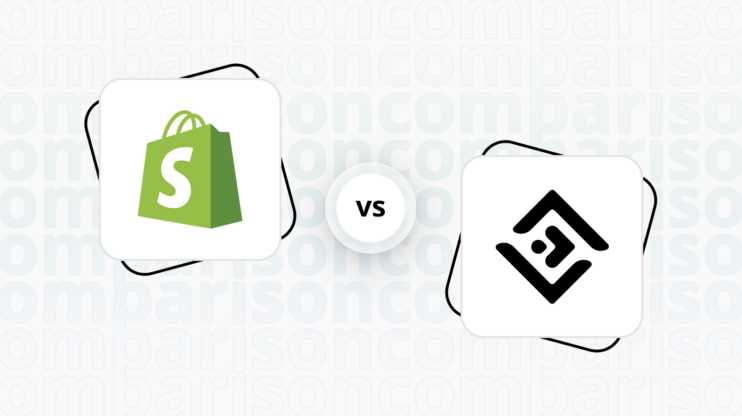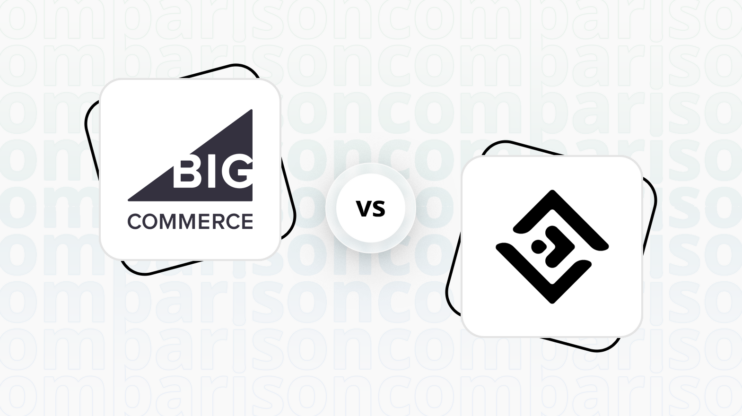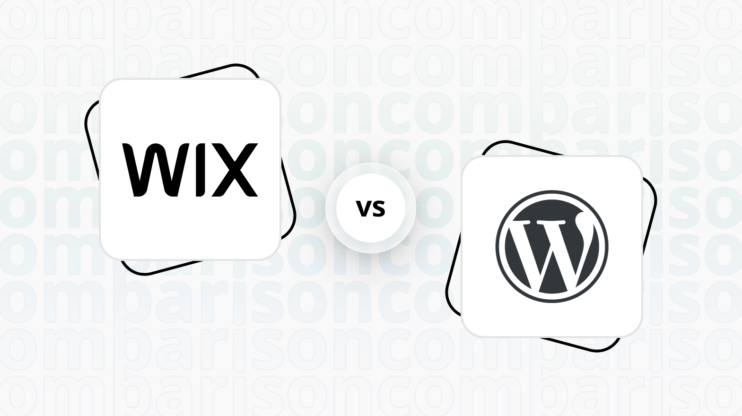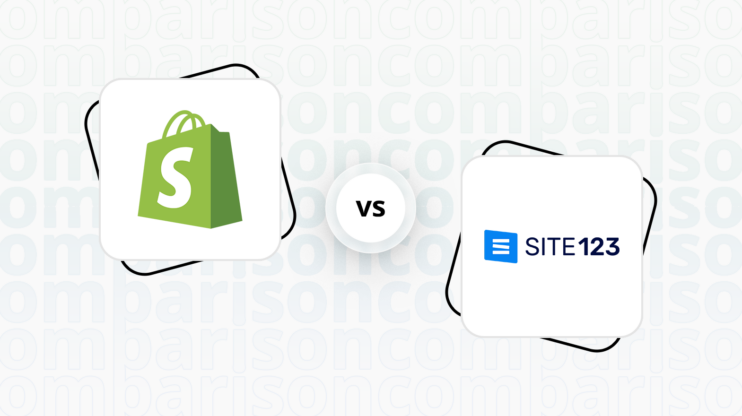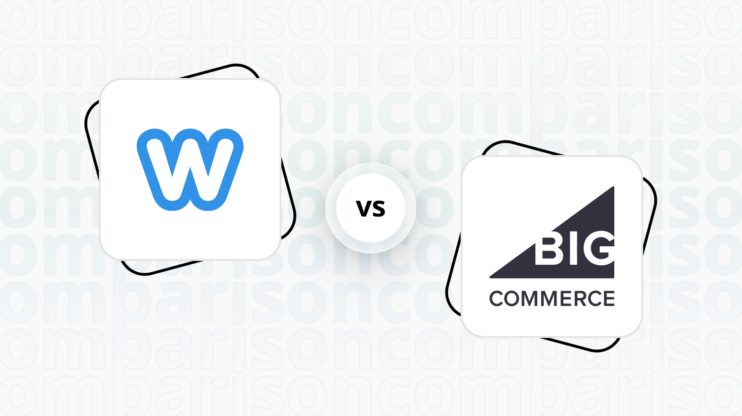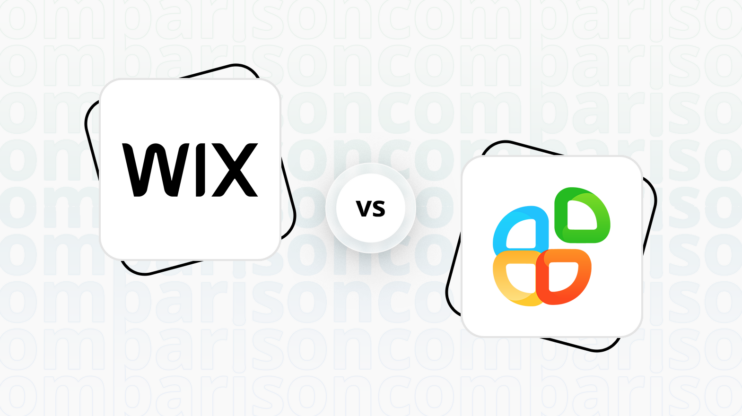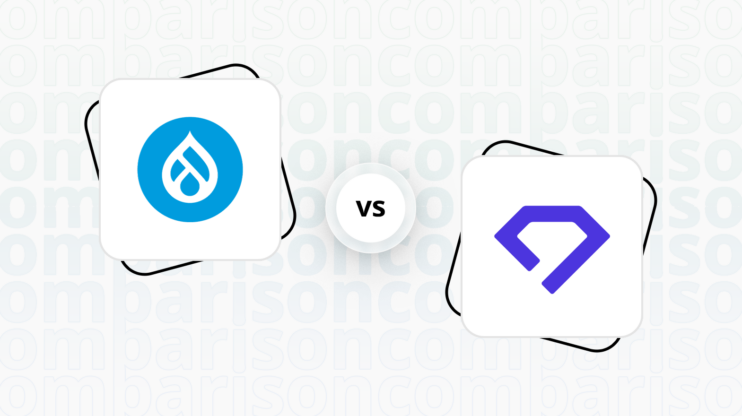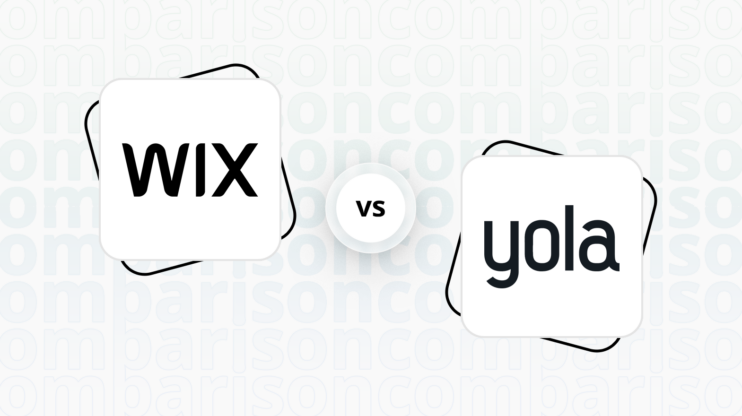Final verdict
Shopify and BigCommerce are both powerful platforms for building ecommerce websites, but they cater to different needs and preferences.
-
Shopify (Overall Grade: 8.1/10)
excels with its user-friendly interface, extensive app marketplace, and robust marketing tools. It’s particularly suited for businesses looking for a comprehensive, scalable ecommerce solution with strong support for sales and marketing. Shopify’s emphasis on design, ease of use, and a wide range of integrations make it a great choice for both beginners and experienced merchants aiming for growth. -
BigCommerce (Overall Grade: 7.9/10)
stands out for its built-in features, advanced SEO capabilities, and unlimited staff accounts, making it ideal for businesses that prioritize extensive ecommerce functionalities without relying heavily on third-party apps. BigCommerce offers a solid foundation for merchants with a focus on multi-channel selling and international expansion, though it may present a steeper learning curve.

|

|
|
|---|---|---|
|
Design Functionalities & Templates |
8.2 |
7.8 |
|
Ease of use |
7.5 |
7.3 |
|
Ecommerce |
9.2 |
9.0 |
|
Website Editors |
7.9 |
7.9 |
|
Product Testing Options |
8.1 |
7.3 |
|
Price |
8.2 |
7.4 |
|
Hosting Quality |
9.0 |
7.8 |
|
Website Speed Optimization |
7.8 |
7.6 |
|
Plugins and Integrations |
8.7 |
7.7 |
|
Marketing Features |
8.8 |
7.9 |
|
Customer Support |
8.6 |
8.7 |
|
Security |
9.0 |
8.9 |
|
AI Capabilities |
7.9 |
7.3 |
|
User Management |
6.5 |
8.9 |
| Overall |
8.1 |
7.9 |
Best for ecommerce
 9.2
9.2
 9.0
9.0
Verdict
: Shopify and BigCommerce are neck-and-neck in ecommerce capabilities, but Shopify slightly edges out with its broader set of integrations and advanced features.
-
Shopify
: With a score of 9.2, Shopify shines for its comprehensive ecommerce toolkit, designed for businesses aiming for growth. It boasts a wide array of features from advanced inventory management to multi-channel selling, making it a go-to for merchants looking for scalability and depth in ecommerce functionalities. -
BigCommerce
: Scoring 9.0, BigCommerce presents itself as a formidable competitor, offering a robust platform with extensive built-in features, including advanced SEO tools and a variety of payment gateway integrations. It’s particularly well-suited for businesses that prioritize a rich set of out-of-the-box ecommerce capabilities without the need for extensive customizations.
Best for informational & business websites
 6.8
6.8
 7.5
7.5
Verdict
: BigCommerce edges out Shopify for informational and business websites, offering a slightly better suite of features tailored for such purposes.
-
Shopify
: Shopify, primarily an ecommerce platform, offers a robust set of tools for online store management. While it can serve informational sites, its core functionalities are best utilized for ecommerce, making it less ideal for purely informational or business-focused websites without retail components. -
BigCommerce
: BigCommerce, with its higher score in this category, demonstrates a stronger alignment with the needs of informational and business websites. It provides a comprehensive platform with a variety of customizable templates and built-in features that support not only ecommerce but also the creation of professional-looking informational sites.
Detailed comparison
Design functionalities & templates
Design FunctionalitiesRepresents how well each platform allows for creative design and customization of websites.Score Components:
- Template Variety (30%): Range and quality of design templates.
- Customization (30%): Flexibility and options for design alterations.
- User Interface (20%): Ease and intuitiveness of the design process.
- Responsiveness (10%): Adaptability to different devices and screen sizes.
- Innovation (10%): Unique design features and tools.
 8.2
8.2
 7.8
7.8
🏆
Winner: Shopify.
If you’re looking for a platform that offers sleek and professional templates ideal for ecommerce sites, Shopify is the preferred choice.
Shopify’s templates offer a sophisticated look with a focus on online stores. While the free template selection is not large, Shopify’s premium theme store provides a variety of industry-specific options, offering advanced features for a strong brand presence.
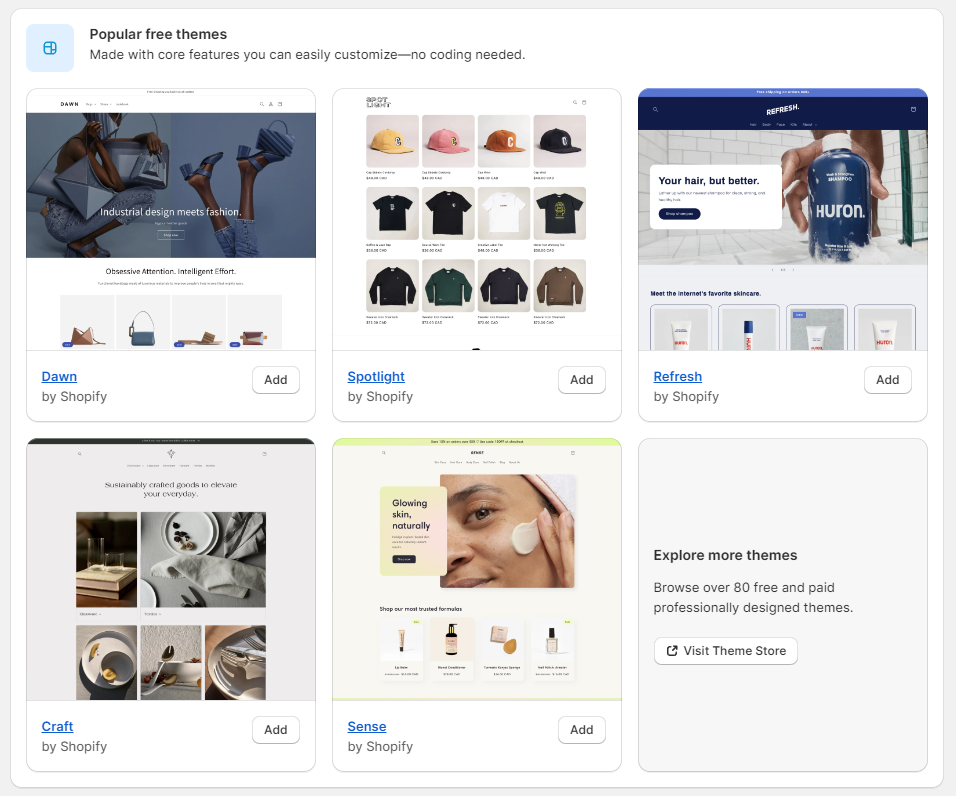
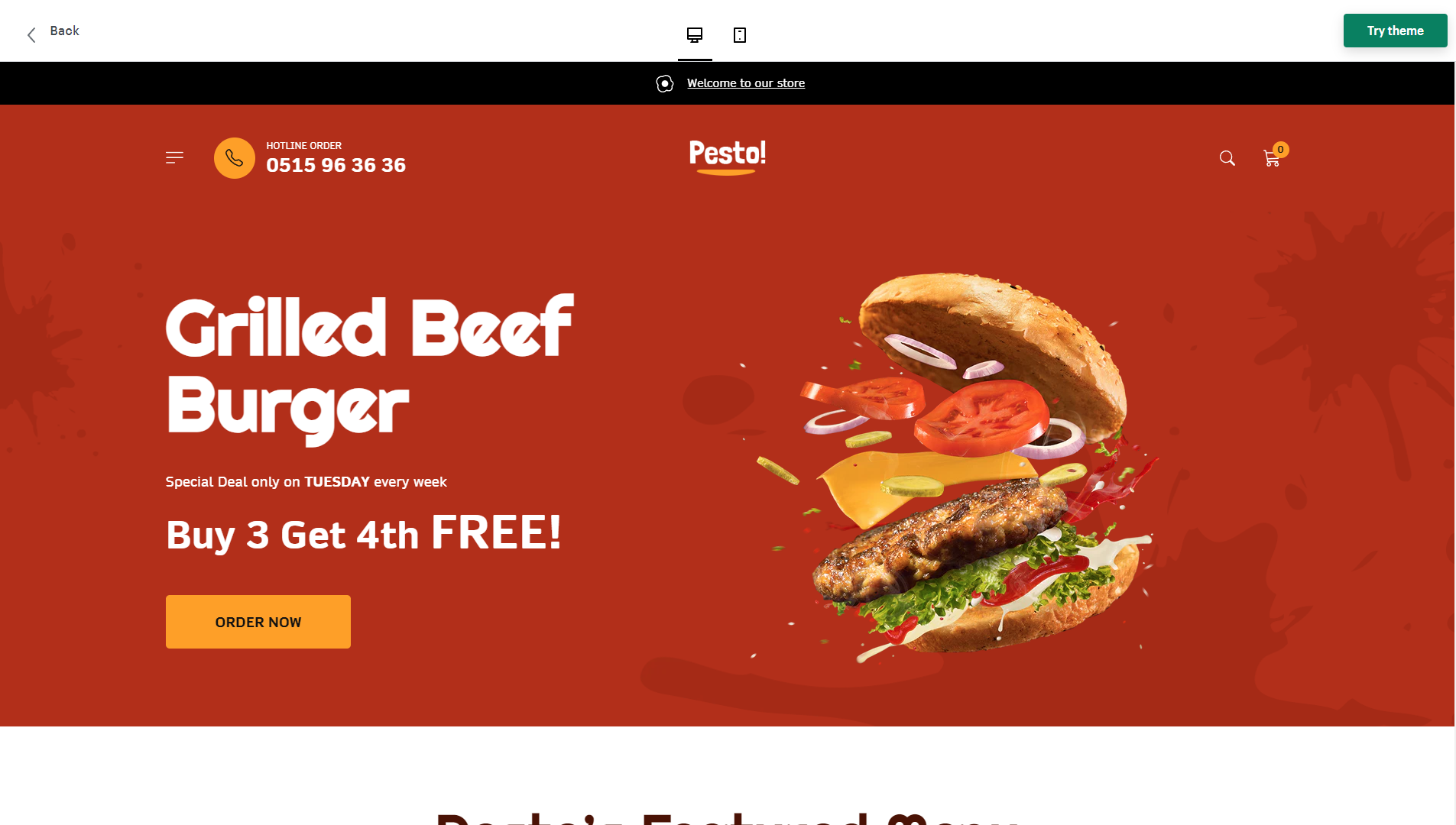
On the other hand, BigCommerce offers a variety of design templates for creating ecommerce websites, with a total of 240 themes available. Most of these themes come with up to four styling options, providing users with flexibility in design choices to match their brand’s aesthetic. There are 12 free themes, while the rest range in price from $150 to $300 each.
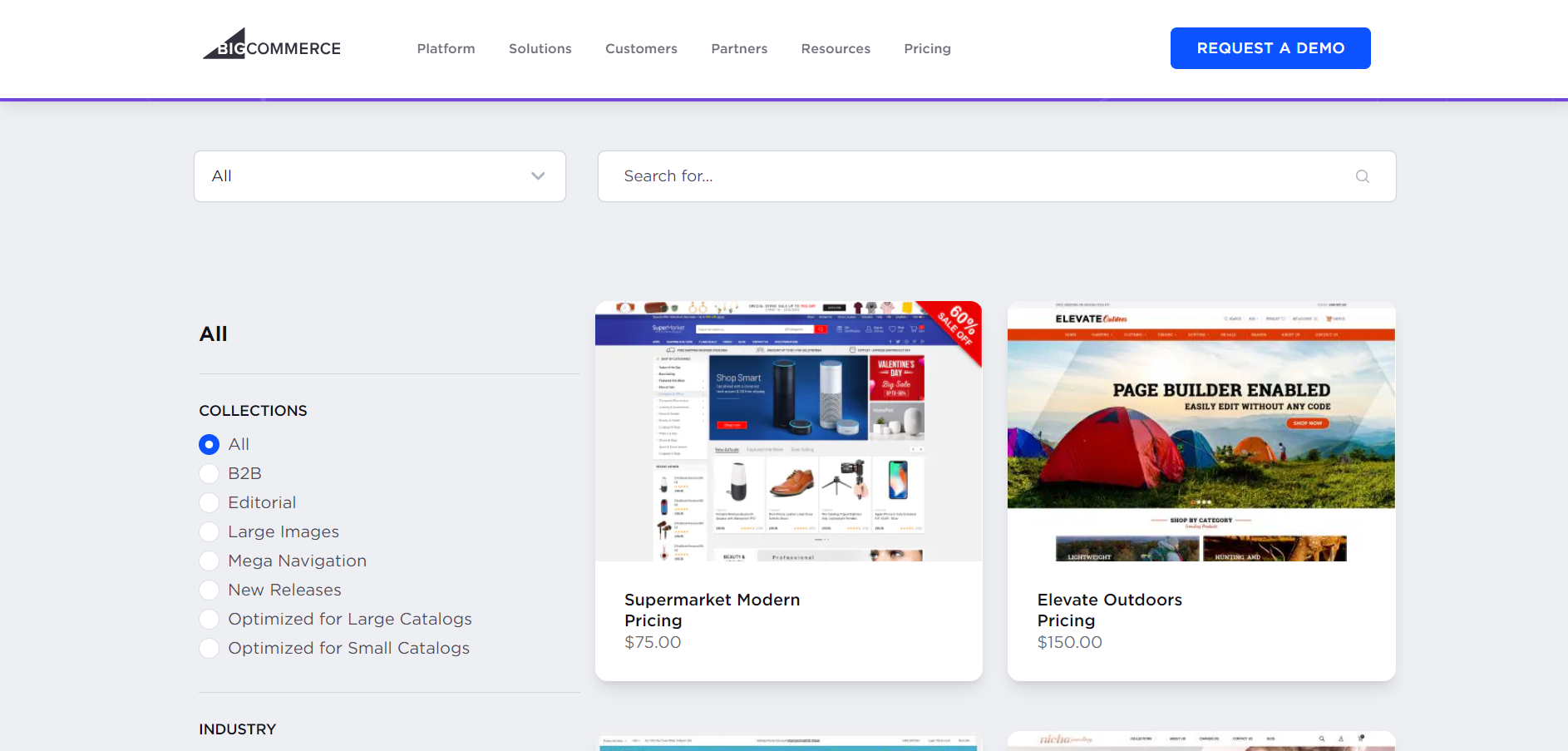
Get a head start on website creation with AI
Create a custom website tailored to your business needs 10X faster with 10Web AI Website Builder!
Ease of use
Ease of useReflects the platform’s overall user-friendliness.Score
Components:
- Learning curve (40%): Quickness and ease of getting started.
- Interface design (30%): Simplicity and intuitiveness of layout.
- User guidance (20%): Quality of tutorials and support.
- Flexibility (10%): Adaptability to various user skills.
 7.5
7.5
 7.3
7.3
🏆 Winner: Shopify
. With a score of 7.5, Shopify edges out BigCommerce, which scored 7.3. Shopify’s user-friendly design and comprehensive support make it a more accessible platform for managing online stores. However, BigCommerce’s robust set of built-in features and extensive support resources make it a strong contender, especially for businesses looking to scale.
Learning Resources
🏆 Winner: Tie
. Both Shopify and BigCommerce offer extensive learning resources, with Shopify focusing on setting up and managing online stores and BigCommerce providing a wide range of resources designed to support e-commerce businesses at various stages of growth.
For ecommerce
EcommerceMeasures the platform’s effectiveness in supporting online business activities.Score Components:
- Ecommerce themes and templates (20%): Variety and design of templates.
- Product management (25%): Ease of managing and organizing products.
- Payment options (25%): Variety and convenience of payment methods.
- Ecommerce features (20%): Features for managing an ecommerce store.
- Integration (10%): Compatibility with external e-commerce tools and services.
 9.2
9.2
 9.0
9.0
When it comes to ecommerce, both Shopify and BigCommerce offer robust solutions. Shopify, with a score of 9.2, is a leading ecommerce platform that provides a comprehensive set of features for online businesses. It offers tools for creating and customizing online stores, managing products, processing payments, and handling order fulfillment. On the other hand, BigCommerce, scoring 9.0, is a comprehensive e-commerce platform offering a wide array of features, including extensive POS integrations, a variety of shipping options, and a selection of over 100 mobile-responsive themes for design customization.

|

|
|
|---|---|---|
|
Ecommerce themes and templates |
8.2 |
8.0 |
|
Product page customization |
8.5 |
8.3 |
|
Payment processing and commissions |
8.8 |
9.2 |
|
POS capabilities |
8.1 |
8.5 |
|
Payment gateways |
9.5 |
9.0 |
|
Product numbers |
9.0 |
9.5 |
|
Additional ecommerce features |
9.1 |
8.4 |
Shopify ecommerce features:
- Comprehensive store builder
- Shopify Payments and other gateways
- Advanced inventory management
- Multi-channel selling
- Abandoned cart recovery
- Detailed analytics and reporting
BigCommerce ecommerce features:
- Unlimited Products
- Streamlined Single-Page Checkout
- Order Management
- Abandoned Cart Recovery
- Marketing and Sales Tools
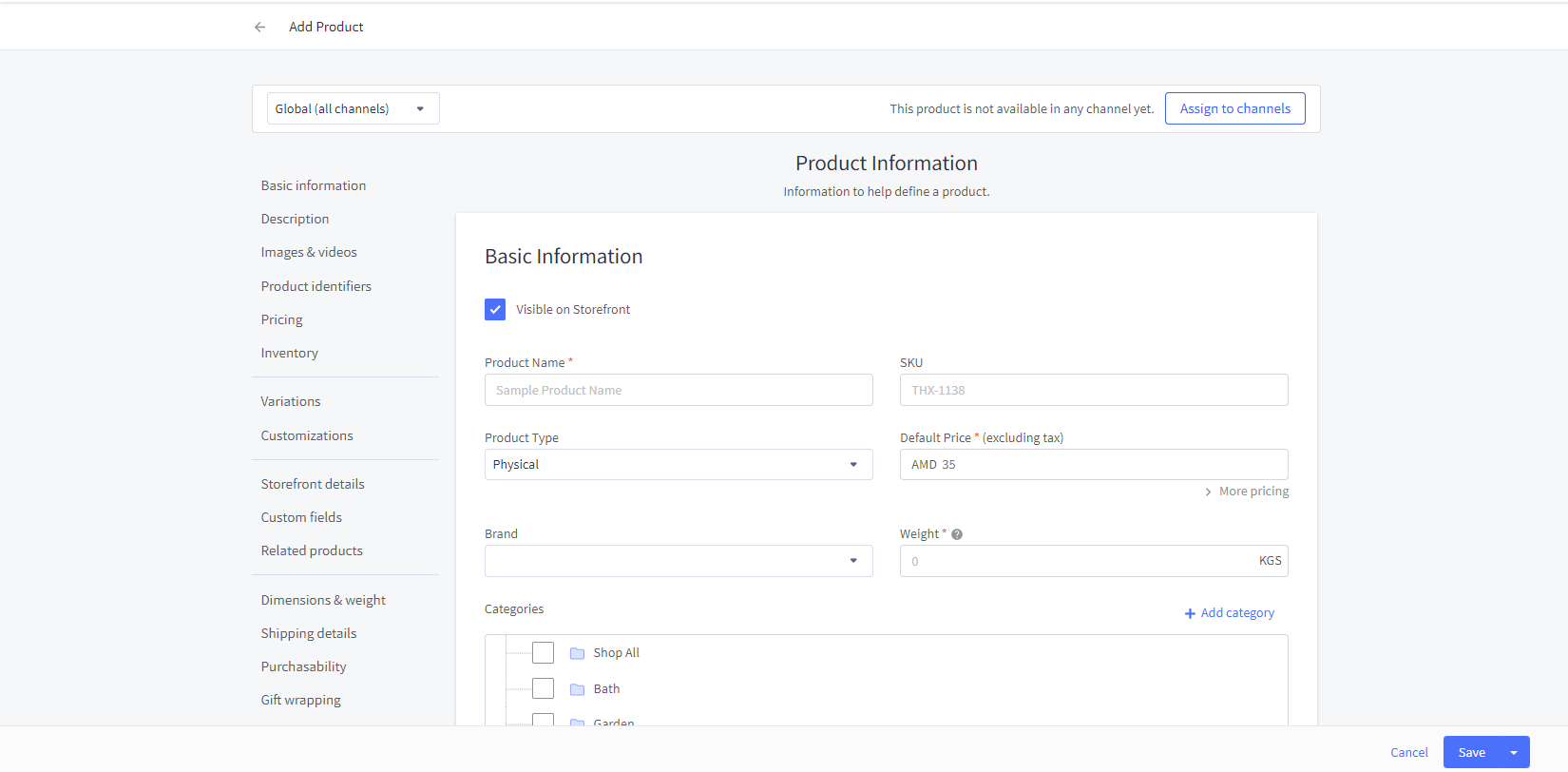
Ecommerce themes & templates
Shopify offers about 150 modern responsive themes for creating a virtual storefront, ensuring a good look on both desktop and mobile devices. While some themes are free, others cost between $170 to $380. In contrast, BigCommerce provides a wide variety of eCommerce templates designed to enhance online shopping experiences and cater to different industries. These templates feature advanced functionalities like quick view, product suggestions, and complex search filters but may require performance optimization for maintaining speed. The selection ranges from free to premium options, ensuring businesses can find a suitable design that aligns with their brand and product offerings.
Product page customization
Shopify has a limit of three options per product, totaling 100 unique variations. This limit may not pose a significant constraint, and it is suggested that for products with numerous options, creating separate listings on Shopify can be a more manageable approach. While Shopify offers titles, descriptions, and image galleries with zoom effects, customization options like adding ribbons, size charts, and wishlists are not as straightforward. However, Shopify distinguishes itself with additional features through its extensive library of extra apps, offering functionalities like reviews, Facebook stores, eBay item importers, and a unique Augmented Reality feature for an enhanced customer experience.
In contrast, BigCommerce allows for extensive customization of product pages to enhance customer experience and improve sales. This includes the ability to create detailed product variants, customize options like custom fields, and upload multiple images or videos for each product.
Payment processing
Shopify offers payments with typical charges of 2.9% + 30¢ per online transaction on basic plans, and lower fees for higher-tier plans. However, it adds extra fees for using other payment gateways. Shopify Payments is Shopify’s own payment processing gateway. It allows merchants to accept credit card payments directly on their store without having to integrate third-party payment providers. This simplifies the payment process, reduces transaction fees, and streamlines the handling of finances.
BigCommerce, on the other hand, supports over 65 pre-integrated online payment solutions, serving customers across 230 countries with more than 140 currencies, without charging additional transaction fees for using third-party payment gateways. This approach provides merchants with the flexibility to choose the best payment solution for their business needs, including the option for custom integration to cater to specific regional payment preferences. Furthermore, BigCommerce’s integration with various POS systems allows for seamless online and in-store sales management, offering a comprehensive solution for businesses looking to maximize their sales channels.
Website Editors
Website EditorsEvaluates the platforms’ website building and editing capabilities.Score Components:
- Customization tools (40%): Range and power of editing features.
- Editor usability (30%): User experience within the editor.
- Design flexibility (20%): Freedom in layout and design changes.
- Update and maintenance ease (10%): Simplicity of updating and maintaining the site.
 7.9
7.9
 7.9
7.9
Draw: Shopify and BigCommerce
. Both Shopify and BigCommerce scored 7.9 for their website editors, indicating comparable capabilities.
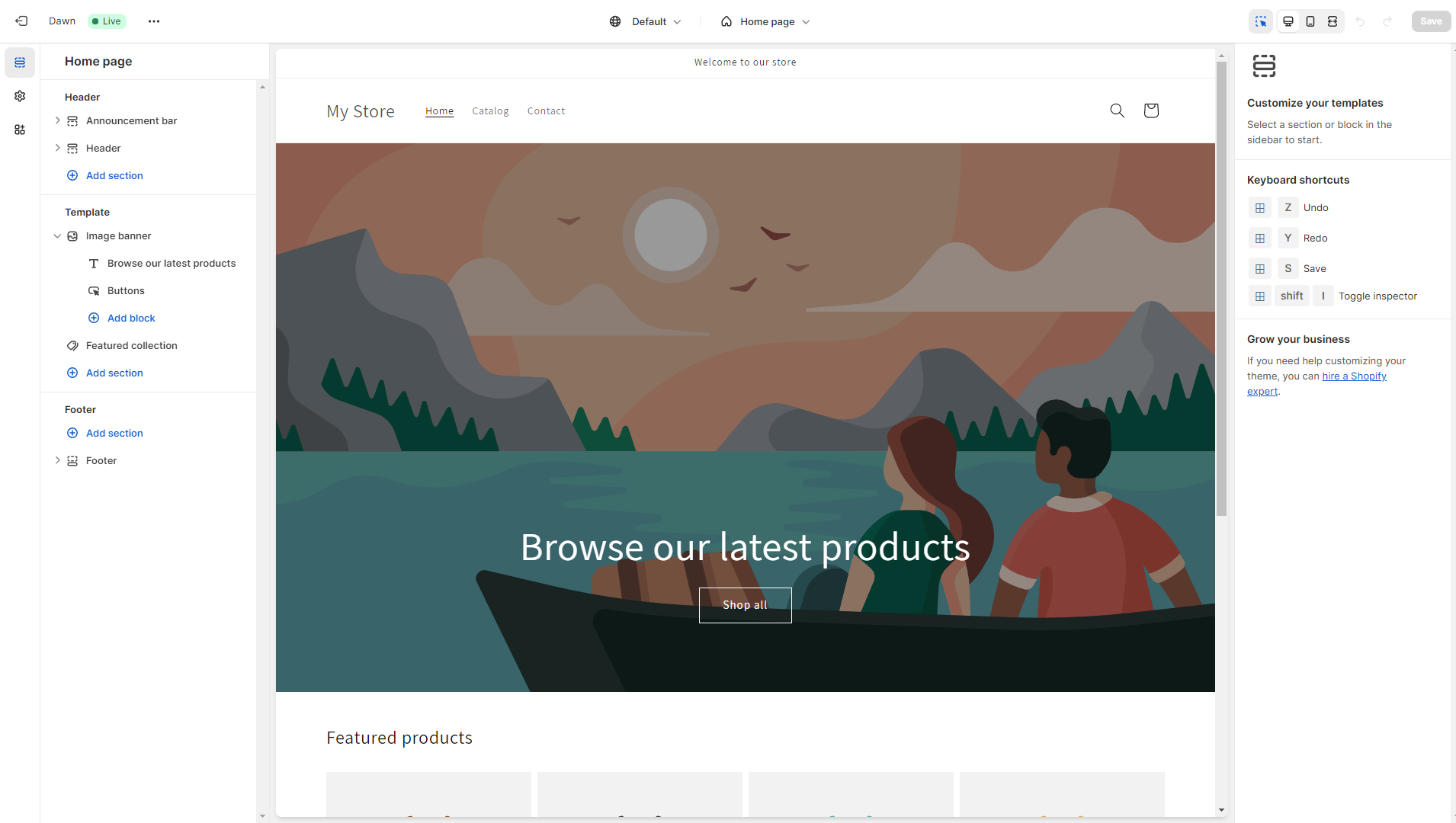
Shopify’s editor excels in providing a streamlined, ecommerce-focused editing experience. It’s particularly beneficial for users who prioritize efficient management of online stores. The editor is straightforward, making it easy to add products, manage inventory, and set up payment methods. Shopify’s editor is optimized for sales and business growth, with built-in tools specifically designed for ecommerce businesses.
BigCommerce’s website builder and editor offer an extensive set of tools designed for creating professional and engaging online stores without requiring coding knowledge. It provides a user-friendly drag-and-drop interface, robust eCommerce capabilities including product management and secure payment processing, and customizable templates to match brand aesthetics. The platform also features powerful SEO and marketing tools, app integrations for extended functionality, and comprehensive analytics to track website performance. These features make it an ideal solution for businesses of all sizes looking to establish or expand their online presence.
Mobile editor/app
 8.0
8.0
 7.5
7.5
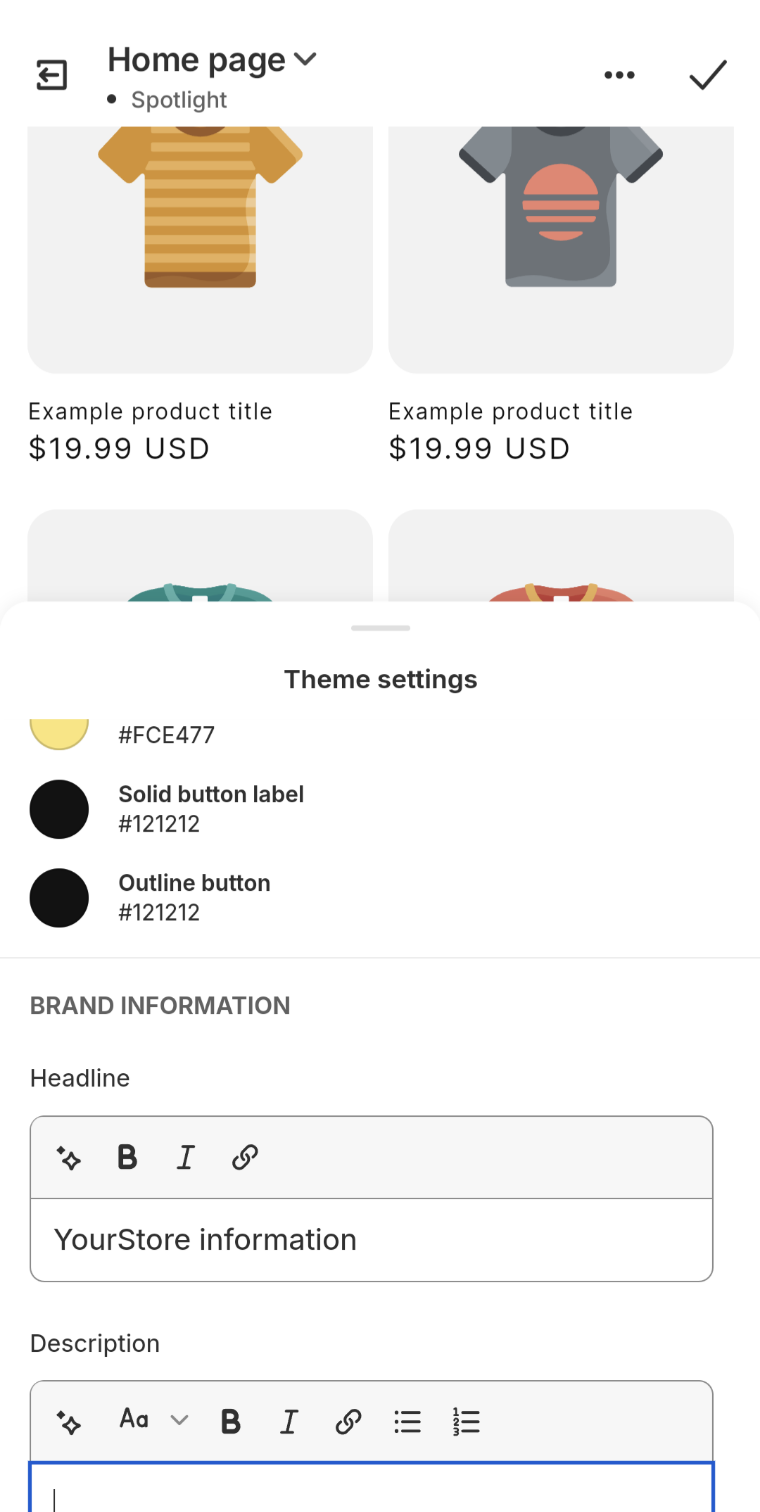
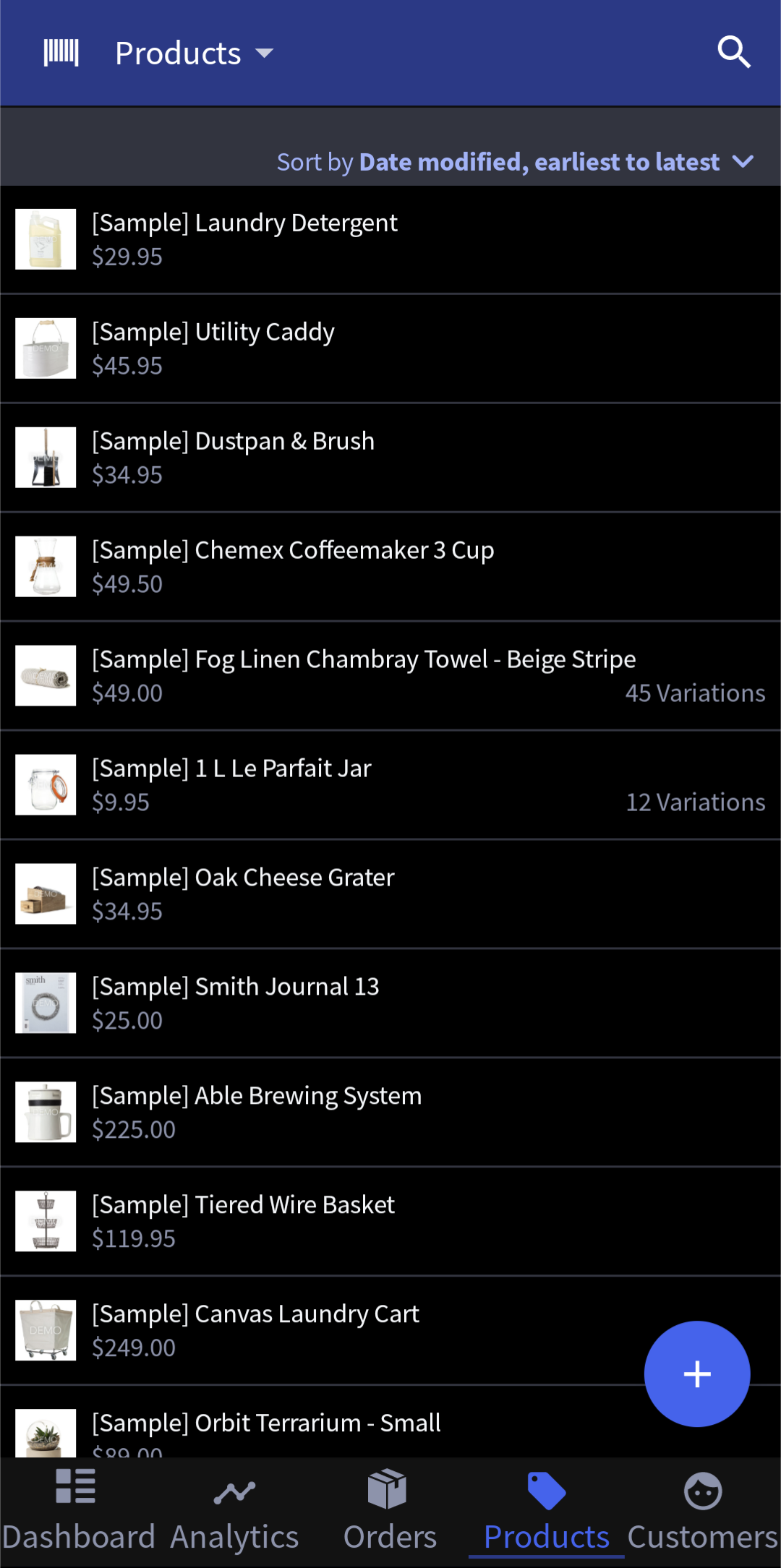
🏆
Winner: Shopify
. Both Shopify and BigCommerce offer mobile apps for managing your website, but they cater to different needs. Shopify’s mobile app includes a user-friendly mobile theme editor that allows users to customize their online store website directly from their mobile device. This feature enables the addition, removal, editing, and rearrangement of content on the store’s website, offering convenient on-the-go adjustments to the store’s appearance and layout.
On the other hand, BigCommerce’s mobile app does not allow website editing. It provides access to the dashboard, analytics, orders, and the ability to add or edit products. While this is useful for managing your store, it does not offer the same level of customization as Shopify’s mobile editor.
In summary, Shopify’s mobile editor offers more comprehensive features and a higher score, making it the winner in this category.
Product testing options
Product Testing OptionsAssesses the options for trying out platform features before commitment.Score Components:
- Trial quality (40%): Extent and usefulness of the trial or free version.
- Feature accessibility (30%): How many features are available to test.
- Trial duration (20%): Length of the trial period.
- Ease of transition (10%): Smoothness of moving from trial to paid plans.
 8.1
8.1
 7.3
7.3
Overall Result
:
Shopify Wins
. Shopify scores 8.1, while BigCommerce scores 7.3 in product testing options. Both Shopify and BigCommerce offer a 14-day free trial, but Shopify stands out by allowing users to test all features, including premium ones, during the trial period. BigCommerce also allows testing of premium features during the trial, but it does not offer a money-back guarantee, unlike Shopify.

|

|
|
|---|---|---|
|
Free Plan |
No | No |
|
Trial Duration |
14 days | 14 days |
|
Testing Premium Features |
All features during free trial |
Yes, during free trial |
|
Money Back Guarantee |
Yes |
No |
Price
PriceLooks at the cost-effectiveness and value for money of each platform.Score Components:
- Plan value (40%): What each pricing tier offers.
- Transparency and clarity (30%): Clearness of pricing structures.
- Flexibility of plans (20%): Range of options to suit different budgets.
- Hidden costs (10%): Additional expenses not included in the plan.
 8.2
8.2
 7.4
7.4
Shopify and BigCommerce both offer a range of pricing plans to cater to different business needs. While Shopify has a slightly higher price score, BigCommerce offers a 25% discount on annual subscriptions compared to Shopify’s 20%.

|

|
|
|---|---|---|
|
$20-$40 |
Shopify Basic ($29/month): Unlimited products, 2.9% + 30¢ card fee with Shopify payments, Extra 2% gateway fee without Shopify Payments, Abandoned cart recovery, Automated sales tax, Digital products, POS Integration, 2 staff accounts. Value for price: 8.0 |
Standard ($39.00/month): Unlimited products, file storage, and bandwidth, suitable for small businesses. Limited to $50k in online sales per year and up to 4 inventory locations. Value for price: 7.0 |
|
$70-$110 |
Shopify Standard ($79/month): Lower card fees (2.6% + 30¢), Gift cards, Professional reports, 5 staff accounts. Value for price: 8.5 |
Plus ($105.00/month): Includes Standard features, plus customer segmentation and abandoned cart saver. Limited to $180k in online sales per year and up to 5 inventory locations. Value for price: 7.5 |
|
$200+ |
Advanced Shopify ($299/month): Lowest card fees (2.49% + 30¢), Advanced report builder, Real-time carrier shipping, Up to 15 staff accounts Value for price: 8.8 |
Pro ($399.00/month): All Plus features, plus Google customer reviews and advanced search filters. Limited to $400k in online sales per year, and up to 8 inventory locations. Additional $150/month for every $200k in online sales. Value for Price: 8.0 |
location. As a result in rare cases the prices displayed here can differ from the ones you see on their
websites.
Hosting quality
Hosting
qualityExamines the reliability and performance of the hosting solutions.Score Components:
- Uptime (40%): Consistency and reliability of website availability.
- Speed (30%): Loading times and performance.
- Bandwidth and storage (20%): Sufficiency of resources provided.
- Data centers (10%): Quality and distribution of hosting infrastructure.
 9.0
9.0
 7.8
7.8
Winner: Shopify
Shopify’s proprietary cloud-based hosting, with a 99.99% uptime guarantee and five global data centers, offers a robust and reliable hosting solution for e-commerce businesses. BigCommerce, while offering cloud hosting with a 99.9% uptime guarantee, does not disclose the locations of its data centers, which may impact site performance and speed for global users. Shopify’s transparency and higher uptime give it the edge in this category.

|

|
|
|---|---|---|
|
Do they offer hosting? |
Yes, included in all paid plans |
Yes, included in all paid plans |
|
Data Centers: |
5 globally: USA (Ashburn, Virginia; Santa Clara, California), Canada (Toronto, Ontario), Ireland (Dublin), and Singapore |
BigCommerce does not disclose the locations of its data centers |
|
Type of hosting: |
Proprietary cloud-based hosting |
Cloud Hosting |
|
Uptime: |
99.99% |
99.9% |
|
Uptime Guarantee: |
Yes, 99.99% |
Yes, 99.99% |
Website Speed Optimization
Website Speed OptimizationEvaluates optimization of website loading timesScore Components:
- PageSpeed Score (30%): Google’s score indicating performance optimization.
- Loading Time (30%): The average time until a website is fully interactive.
- Mobile Optimization (15%): Optimization effectiveness for mobile devices.
- Resource Optimization (15%): Optimizing images, scripts, and other heavy resources.
- CDN Usage (10%): Use of CDN to enhance speed across geolocations.
 7.8
7.8
 7.6
7.6
🏆 Winner: Shopify
Both Shopify and BigCommerce place a high priority on website performance and page speed, with Shopify focusing on app efficiency and theme optimization, and BigCommerce emphasizing image optimization, code minification, optimized templates, using AMP, and caching. However, Shopify gets a slight edge when it comes to website speed optimization.

|

|
|
|---|---|---|
|
Focus |
App efficiency, Theme optimization |
Image Optimization, Code minification, Optimized templates, Using AMP, Caching |
|
Performance Tools |
Google Lighthouse, PageSpeed Insights |
Google PageSpeed Insights Integration |
|
Key Strategies |
App efficiency, Theme optimization |
Image Optimization, Code minification, Optimized templates, Using AMP, Caching |
|
Load Times |
Varies widely, dependent on optimization |
Varies depending on optimization and website complexity |
|
Page Speed Scores Range |
Scores vary; influenced by apps, images |
Varies depending on optimization and website complexity |
|
Core Web Vitals Improvement |
Emphasis on LCP, FID, CLS improvements |
Provides users with many tools for CVW improvements |
Shopify’s approach to enhancing site speed includes app optimization by removing unneeded app code, conditionally loading apps, avoiding immediate pop-up displays, and incorporating app functionality directly into themes. This approach leverages Shopify’s fast servers and CDN network to boost load speed. Shopify also suggests utilizing Google AMP for faster mobile page loads, although with some design compromises.
On the other hand, BigCommerce provides a comprehensive set of tools for website speed optimization. It emphasizes image optimization, code minification, optimized templates, using AMP, and caching. BigCommerce also provides users with many tools for Core Web Vital improvements of their websites. However, its load times and PageSpeed scores vary depending on optimization and website complexity.
Get a head start on website creation with AI
Create a custom website tailored to your business needs 10X faster with 10Web AI Website Builder!
Plugins and integrations
Plugins and integrationsMeasures the range and effectiveness of additional plugins and integrations.Score Components:
- Variety of options (40%): Range of available add-ons.
- Integration smoothness (30%): Ease of integrating plugins into the site.
- Quality of plugins (20%): Functionality and reliability of the options.
- Custom integration capabilities (10%): Support for custom or third-party integrations.
 8.7
8.7
 7.7
7.7
🏆 Winner: Shopify.
With a score of 8.7, Shopify outperforms BigCommerce, which scores 7.7. Shopify offers over 8,000 apps in its App Store, covering a wide range of functionalities. These apps come with various pricing options, including free, paid, freemium, and one-time payment models.
On the other hand, BigCommerce supports a wide array of apps and integrations, including ERP and CRM systems, 3PL services, POS systems, and various marketing tools, to enhance eCommerce functionalities. While some integrations are available directly through pre-made connectors for services like Salesforce, Zoho, and several 3PL providers, others may require custom integration solutions. The mix of available apps includes both free and paid options, catering to a range of business needs and budgets. Despite the robust offerings of BigCommerce, Shopify’s extensive range of apps and higher score give it the edge in this category.
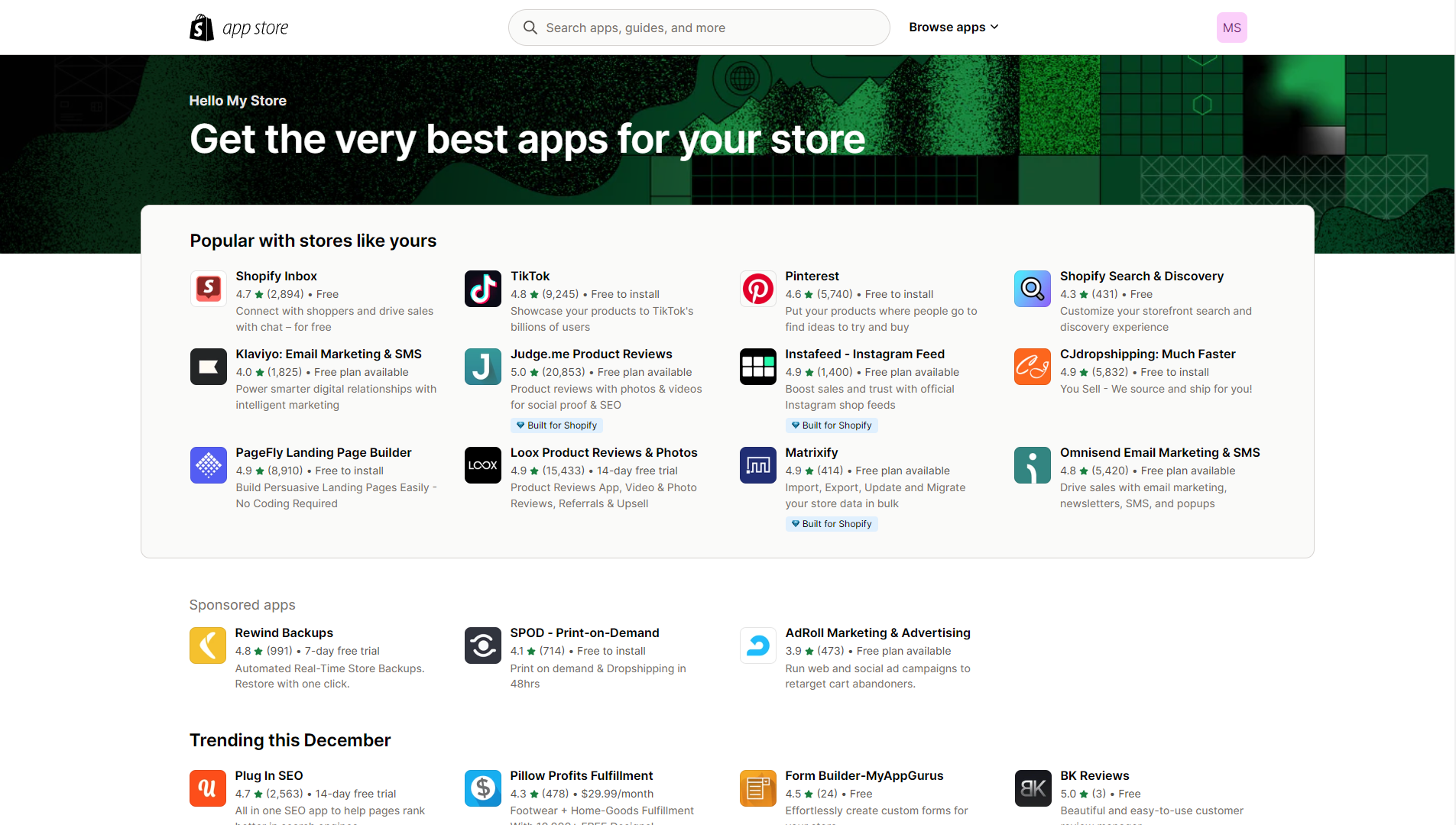
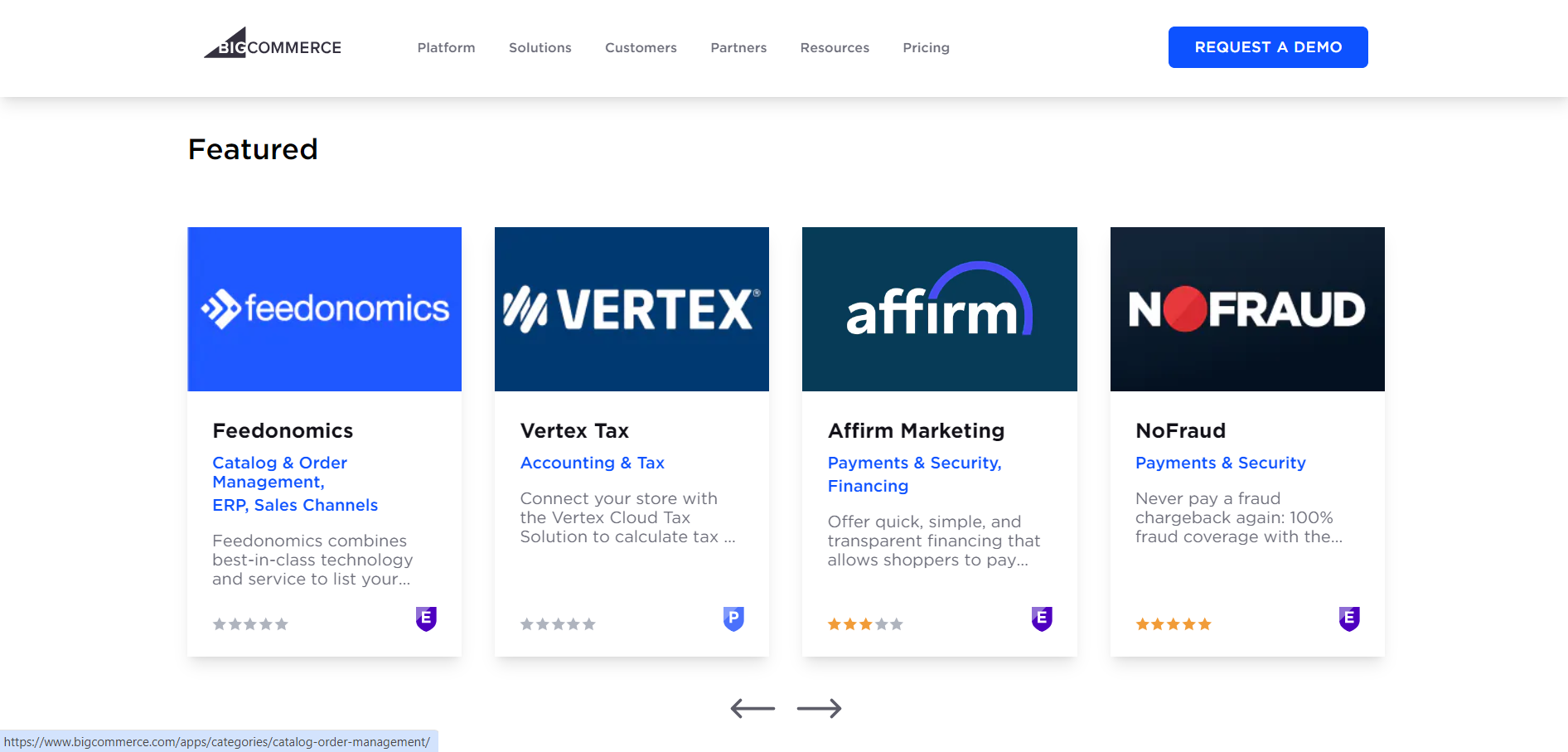
Marketing Features
Design FunctionalitiesRepresents how well each platform allows for creative design and customization of websites.Score Components:
- Template Variety (30%): Range and quality of design templates.
- Customization (30%): Flexibility and options for design alterations.
- User Interface (20%): Ease and intuitiveness of the design process.
- Responsiveness (10%): Adaptability to different devices and screen sizes.
- Innovation (10%): Unique design features and tools.
 8.8
8.8
 7.9
7.9
🏆
Overall Winner: Shopify
. Shopify stands out for its more advanced ecommerce-focused marketing tools, especially in analytics and ad campaign management. BigCommerce, while offering a comprehensive set of marketing tools, falls slightly behind in comparison.

|

|
|
|---|---|---|
|
SEO Tools |
|
|
|
Email Marketing |
|
|
|
Blogging |
|
|
|
Social Media Integration |
Advanced integration for selling directly on social platforms |
Yes |
|
Analytics and Reporting |
Detailed analytics for in-depth insights |
Yes |
|
Ads and Promotions |
Google Ads integration; sophisticated ad campaign management |
Yes, through third-party integrations |
Customer Support
Customer supportEvaluates the quality and availability of support options.Score Components:
- Response time (40%): Speed of support responses.
- Support quality (30%): Effectiveness and helpfulness of the support.
- Availability (20%): Range of support channels (phone, chat, email).
- Resource richness (10%): Quality of self-help and educational materials.
 8.6
8.6
 8.7
8.7
🏆 Winner: BigCommerce
. BigCommerce slightly edges out Shopify in this category with a score of 8.7 compared to Shopify’s 8.6. Both platforms offer 24/7 support through various channels, including phone, email, and live chat. However, BigCommerce’s commitment to user satisfaction and problem resolution is evident in its multi-faceted support system, which includes dedicated phone lines for several regions and a support pin for personalized assistance.
Shopify also provides excellent support services, with clear and beneficial tutorials, an extensive community, and a valuable marketing blog. For enterprise-level businesses, both platforms offer dedicated programs and additional resources. However, BigCommerce’s express routing and priority support for enterprise customers ensure quicker and more efficient resolution of inquiries, giving it a slight edge over Shopify in this category.
Security
SecurityLooks at the platforms’ security measures and data protection.Score Components:
- Data protection (40%): Safeguards for user and customer data.
- SSL and encryption (30%): Implementation of secure connections.
- Compliance (20%): Adherence to industry security standards.
- Regular updates (10%): Frequency of security updates and patches.
 9.0
9.0
 8.9
8.9
🏆
Winner: Shopify
. Shopify’s security measures are top-notch, with a focus on data privacy and security through secure infrastructure, encryption, and limited access. They comply with data privacy regulations, practice data minimization, and ensure user control and transparency. Additional security measures include two-factor authentication, regular audits, and a dedicated incident response team. Shopify also ensures website security with SSL certificates encrypting data, verifying website identity, and offering SEO benefits. Free SSL certificates are provided, with options for upgrades. The built-in Web Application Firewall filters and blocks threats, and users can add third-party firewalls for extra control and security.
BigCommerce also prioritizes data privacy and security by adhering to international regulations like GDPR and CCPA, employing data encryption for transmissions and at-rest storage, and hosting on secure data centers with robust access control. The platform conducts regular security audits and continuous monitoring to preempt vulnerabilities, alongside ensuring data integrity through regular backups and recovery strategies. Additionally, BigCommerce empowers merchants with resources for best practices in security management. However, the responsibility for maintaining security also extends to merchants, who are advised to follow strong security measures on their end. BigCommerce employs a robust array of security measures to safeguard online stores, including compliance with international standards like the EU-US Data Privacy Framework, SOC1 & SOC2 reports, PCI DSS, and ISO certifications for data and privacy management. It also enhances security through technical measures such as GDPR compliance, PCI/DSS adherence, and the use of TLS, SSL, and HTTPS for secure data transmission. A partnership with Cloudflare further bolsters security, alongside a shared responsibility model for account security, emphasizing both platform and user roles in protecting data.
AI Capabilities
AI capabilitiesMeasures the effectiveness of AI-driven features and tools.Score Components:
- Automation efficiency (40%): Impact of AI on streamlining processes.
- Personalization (30%): AI-driven customization for users or customers.
- AI-Assisted design (20%): Role of AI in website design and functionality.
- Data analysis (10%): Use of AI in interpreting user data and analytics.
 7.9
7.9
 7.3
7.3

|

|
|
|---|---|---|
|
AI Builder |
Shopify AI Builder offers functionalities like theme section builder, content generation, SEO optimization, and email marketing tools. |
BigCommerce does not have an AI website builder. |
|
AI Ecommerce Features |
Shopify offers AI-driven eCommerce features like personalized recommendations, dynamic search, automated marketing, and data analysis tools for sales forecasting, customer segmentation, and dynamic price optimization. |
BigCommerce offers personalized product recommendations, AI on-site search, and AI powered chatbots through its integrated apps. |
|
AI Content Generation |
Shopify’s AI features Content Assistant which helps to brainstorm ideas, overcome writer’s block, and generate outlines for product descriptions, blog posts, social media captions, and more. |
BigCommerce offers AI-powered writing tools for creating product descriptions and the ChatGPT AI Content Master by Amasty, an application designed to streamline the creation of product content and SEO metadata. |
|
Additional AI Features |
Shopify offers additional AI features like demand forecasting, automated replenishment, smart fraud detection, chargeback management, AI-powered chatbots, sentiment analysis, route optimization, and warehousing optimization. |
BigCommerce integrates AI technology to enhance ecommerce operations, offering AI-powered writing features for product descriptions, personalized storefronts through product recommendations, and AI-driven data analytics for deeper business insights. Additionally, the Maisie AI chatbot assists with sales, customer service, and marketing list growth. |
🏆 Winner: Shopify
. Shopify, with a score of 7.9, utilizes AI mainly to enhance the ecommerce experience. Its AI features focus on customer behavior analysis, personalized shopping experiences, inventory management, and sales predictions. While Shopify’s AI is powerful, it is more business and data-centric compared to BigCommerce’s design-focused AI.
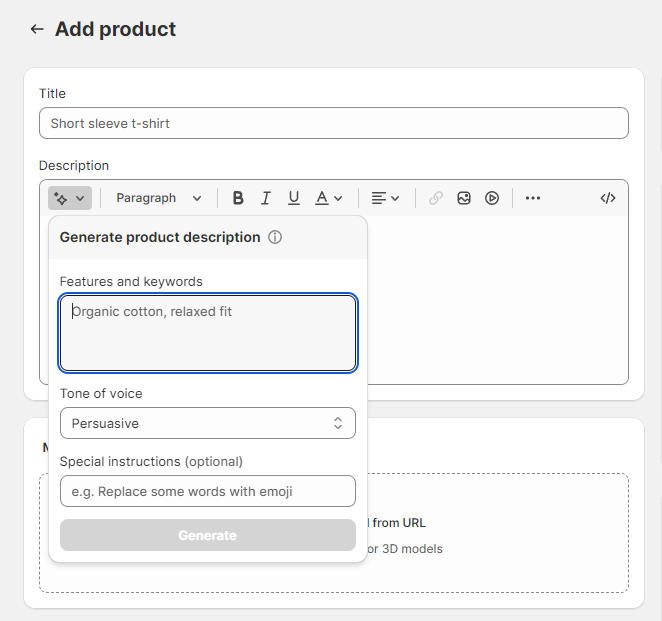
BigCommerce, with a score of 7.3, offers AI features primarily through its integrated apps. These features include personalized product recommendations, AI on-site search, AI-powered chatbots, and AI content generation tools. However, it lacks a dedicated AI builder, which puts it at a disadvantage compared to Shopify.
User Management
User ManagementAssesses the platforms’ capabilities in managing user roles, permissions, and accessibility.Score Components:
- Role Customization (40%): Flexibility in creating and defining user roles and
permissions. - Ease of Management (30%): User interface and tools for managing users.
- Access Control (20%): Effectiveness of access control measures for different user
levels. - Scalability (10%): Ability to manage a growing number of users efficiently.
 6.5
6.5
 8.9
8.9
🏆 Winner: BigCommerce
. Both Shopify and BigCommerce offer different approaches to user management, but BigCommerce’s unlimited staff accounts and more detailed role customization give it an edge.
-
Shopify enforces staff account limits based on plans, ranging from 2 to 15, with Shopify Plus offering unlimited
accounts. Collaborators with limited access are also an option. - BigCommerce allows an unlimited number of staff accounts with various roles and permissions.
Shopify User Roles and Access Levels:
| Role | Description | Access Highlights |
|---|---|---|
| Store Owner | Full control over store | Manage products, orders, discounts, payments, apps, settings. Create and manage staff accounts. |
| Staff | Configurable access by owner |
Add/edit products, manage orders, fulfill orders, manage customers, update content. Access level can be customized by the owner. |
| Collaborator | Limited access for external partners | View and manage specific sections like blog or product categories. Cannot access full store settings. |
BigCommerce User Roles and Access Levels:
| Role | Description | Access Highlights |
|---|---|---|
| Sales Staff | Enables all Sales Staff permissions | Manage, edit, and add orders, finalize manual orders with manual payments, manage returns, capture funds, and refund orders. |
| Sales Manager | Enables all Sales Staff and Sales Manager permissions | Includes Sales Staff permissions, manage, create, edit, and delete products, manage product options and categories. |
| Store Administrator | Enables all Sales Staff, Sales Manager, and System Admin permissions | Includes Sales Staff and Sales Manager permissions, manage users and form fields, manage settings. |
| Store Owner | Includes all permissions and is the person financially responsible for the account | Full access to all permissions and features across the platform, exclusive access to account-related features and settings. |
| Custom | Use this option to create your own combination of permissions | Customize permissions based on specific needs, mix and match permissions from different roles to create a unique role. |
Additional Features

|

|
|
|---|---|---|
|
SSL Certificate |
|
|
|
Custom Domain |
|
|
|
Free Custom Domain Included |
|
|
|
International Domains |
|
|
|
Mobile Responsive |
|
|
|
Page Speed |
|
|
|
Website Builder Mobile App |
|
|
|
Convert a Website To An App |
|
|
|
Website Analytics |
|
|
|
Multilingual Sites |
|
|
|
Multiple Users |
|
|
User Feedback
Shopify’s slightly higher rating on G2 Crowd can be largely attributed to its specialization in ecommerce. Its comprehensive features, ease of use, and robust customer support cater specifically to online businesses, leading to high user satisfaction among those seeking a dedicated ecommerce solution.
User feedback on BigCommerce highlights a mix of experiences, with positive remarks on its ease of use, SEO configuration, and strong support team. However, significant criticisms include its lack of suitability for businesses with brick-and-mortar locations, due to issues with POS integration and sales tracking, as well as its inflexibility with customization and additional costs for necessary features. Additionally, concerns were raised about the platform’s steep learning curve for beginners, limitations in product variation and design options, and difficulties with order management. Despite these challenges, some users appreciate the platform’s ability to quickly launch and reliably host stores, alongside its potential for scalability and e-commerce growth.
The making of this blog
We followed a clear, step-by-step process to write and research this article.
FAQ
Which platform is better for ecommerce, Shopify or BigCommerce?
Can I use Shopify or BigCommerce for a non-ecommerce website?
How do Shopify and BigCommerce compare in terms of design and customization?
Which platform offers better customer support, Shopify or BigCommerce?
Are Shopify and BigCommerce suitable for international sales?
Which platform is easier to use for beginners?
How do Shopify and BigCommerce handle website speed and optimization?
Can I manage multiple users and permissions on both platforms?
Which platform offers better SEO capabilities?
How do the costs of Shopify and BigCommerce compare?










